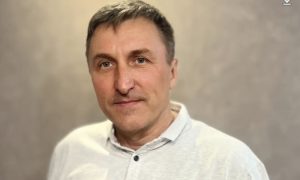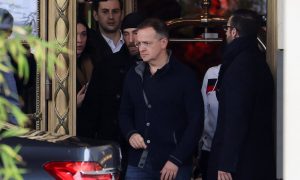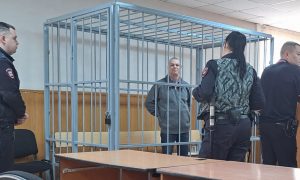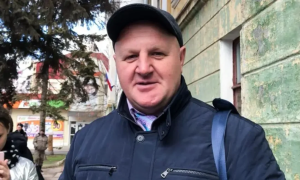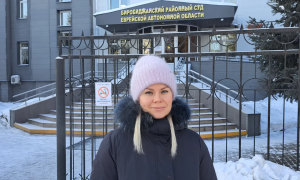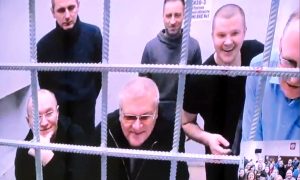| 9am |
In Moscow, a soft rain drizzles. Along the facade of the Supreme Court stretched a large queue of those who came to the process as listeners. A large bus is parked at the courthouse on Povarskaya Street, full of obviously bored police officers. Such a loud process seems to be a riotous event for court employees. However, surprising calm, which, despite obvious excitement, is preserved by hundreds of believers, convinces better than any words that extremism is not about them. |
|---|---|
| 9:40 | The Great Hall of the Supreme Court is gradually filled with listeners and journalists. |
| 10am | The process began with questions of the court to the representative of the Ministry of Justice. The court is trying to understand that the plaintiff charges the Management Center with the episode from 2014, when, according to the ministry, the Management Center imported a publication to Russia, which would later be recognized as extremist materials. The court is interested in the question of how the religious organization could know that the book will be recognized as extremist if it is not in the FSEM. |
| 10:10 | The court tries to understand which rule of law the Justice Ministry relies on, arguing that local religious organizations (MPOs) are “structural subdivisions” of the Management Center. The Justice Ministry believes that this is logical, since organizations read the same literature and are related to each other. The court asks how, in this case, this meets the requirements of legal certainty. Will this not violate the right to freedom of religion enshrined in the European Convention? After all, it was denied the involvement of 395 organizations to participate in the case as co-defendants. Questions remain without distinct answers. |
| 10:20 |
The judge asks the representative of the Ministry of Justice, on the basis of which they claim that the financing of the LRO by the Management Center is precisely the financing of “extremist activity”? What is objectively proved? If nothing, then what are the claims of the Ministry of Justice based on?
|
| 10:28 | The queue of objections goes to the defendants. However, first of all, the lawyer Omelchenko applies for the inclusion in the case of extracts from the Russian newspaper with the dates of the entry of certain publications into the FSEM. The court adjuncts. |
| 10:35 | The first speaker is Vasily Kalin, chairman of the steering committee of the “Administrative Center of Jehovah’s Witnesses in Russia.” Are today’s efforts to prohibit Witnesses lawful? For 26 years, the center has not been held accountable for extremism. “If we have been good all these years, at what point have we become extremists?” If the ban happens, significant harm will be done, and the persecution has already begun. People will be persecuted only for the joint reading of the Bible, and we have already passed. We have already been put on a par with such organizations as the Taliban, Aum Senrique and others. The position of Jehovah’s Witnesses is unchanged: obey the authorities, pray for them. Always adhere to the principles of peacefulness. |
| 10:45 |
Kalin tells the circumstances of the repression of this religion in the USSR, which he remembers himself. He shows the court a certificate of a rehabilitated victim of political repression. He asks what certificate now he wants from the Ministry of Justice and his co-religionists. The actions of the Ministry of Justice throw the country into the past. |
| 10:50 | Performs Deputy Kalina, Sergei Cherepanov. He tells us what measures were taken by the center of Jehovah’s Witnesses for the prevention of extremism. |
| 10:57 | Cherepanov mentions that the center of Jehovah’s Witnesses is on the list of the most dangerous organizations. He is not a lawyer, but thinks that the actions of the ministry lead the fight against extremism on a false track. In recent years, 20 criminal cases have been instituted against Jehovah’s Witnesses under article “Extremism.” Although most cases ended in acquittals, the rights of believers were significantly violated, and their lives were marred. |
| 11:05 | Cherepanov mentions cases of throws and falsifications that were reported to law enforcement agencies, but are completely ignored by the police and other bodies. There is no doubt that the center of Jehovah’s Witnesses has taken all possible measures to counter extremism. The deputy prosecutor general, who signed a warning a year ago to Jehovah’s Witnesses, refused a meeting at which it would be possible to clarify what other measures the supervisory authority could expect from Jehovah’s Witnesses. |
| 11:13 |
They struggle with extremism in the whole civilized world. However, only in Russia for this persecuted Jehovah’s Witnesses, whose worship in the world is visited by about 20 million people. To pursue them in Russia is to challenge all those countries where Jehovah’s Witnesses freely profess their faith. At this Cherepanov ends his speech and asks to attach the theses of his speech to the case. |
| 11:15 | The speech of lawyer Zhenkov. He convincingly proves that, contrary to the Justice Ministry’s statement, among the goals and objectives of the organization of Jehovah’s Witnesses there is no extremism. If for 100 years unofficially and 26 years of officially existence of Jehovah’s Witnesses there was no proven harm from their activities, then what harm does the Ministry of Justice refer to? |
| 11:20 | Zhenkov draws attention to the fact that the vast majority of Witness publications were included in the FEMC 8 years ago. During these years there was not a single terrorist act or act of vandalism on the part of Jehovah’s Witnesses. Nothing of the kind happened before. |
| 11:24 | Zhenkov draws attention to the fact that all these publications were included in the FSEM before the famous resolution of the plenum of the Supreme Court, which explained that extremism can not be considered criticism of other religions. |
| 11:25 | Zhenkov emphasizes that only some experts find signs of extremism in the literature of Jehovah’s Witnesses. Often unskilled experts work. Courts consider cases in the absence of believers. For example, one of the brochures, which contains almost no text, was considered extremist for the phrase “Avoid bad deeds.” In response to laughter in the room, Zhenkov said that people who are being searched because of this brochure are not to laugh. |
| 11:30 | Two other publications have been made to the FSEM, but Jehovah’s Witnesses still do not know why, despite many requests and requests. “If so consider printed texts, then Russia can soon be left without books!” |
| 11:35 | Zhenkov: It seems that the prosecutor’s office is trying by any means to recognize as extremist as possible a large number of materials of Jehovah’s Witnesses. For example, the prosecutor’s office sued the recognition of the extremist Bible itself, despite a direct reservation in law that the Bible and quotations from it can not be considered extremist. From the prosecution’s argument: “Taken as a book, the Bible ceases to be a Bible, which it is only in the Church.” (Laughter in the hall.) |
| 11:39 | Zhenkov draws attention to the fact that cases related to the recognition of the literature of Jehovah’s Witnesses as extremist have been appealed to the ECHR. 22 complaints and combined into one production. In response to a request from the Strasbourg Court, the Russian Federation formally acknowledged that the literature of Jehovah’s Witnesses does not contain open calls for violence. |
| 11:45 | The Supreme Court repeatedly ruled that the cases of recognizing the materials of Jehovah’s Witnesses as extremist did not affect the rights of the “Administrative Center of Jehovah’s Witnesses in Russia”, and these decisions were not abolished. And the Ministry of Justice now believes that on the contrary, it affects the rights of the center. But this is a mistake. |
| 11:55 | Lawyer Zhenkov documents that the printed materials were never imported into the country after they were recognized as extremist. This also applies to all episodes that the Ministry of Justice imputes to believers in their lawsuit. |
| 12:05 | When almost every publication in the country was imported to the center of Jehovah’s Witnesses, there were results of examinations that did not reveal any signs of extremism in them. Thus, the center could not foresee that these or other materials can be considered extremist. Legislation is based on the principles of legal certainty and predictability of the consequences of certain actions. However, in the actions of state bodies against Jehovah’s Witnesses, this principle is clearly not observed. |
| 12:10 | Speech representative Respondent Toporov. “The extremism of Jehovah’s Witnesses remains extremism on paper.” No victims, victims or victims of alleged “extremist” activities, either the Prosecutor’s Office or the Justice Ministry could not have imagined. |
| 12:12 | Топоров refutes the thesis of the Ministry of Justice on “financing of extremism”. The financial aid directed by the LRO was directed to the service of liturgical buildings, payment of public utilities, sometimes to help believers who suffered from natural disasters. |
| 12:17 | Representative of the Axes: The Ministry of Justice encourages the Supreme Judiciary of the country to resort to double standards. Earlier, the court, with the support of the Ministry of Justice, held a consistent position that decisions against local organizations did not affect the rights of the Management Center. Now the position of the ministry has changed to the exact opposite. It is trying to extend the sanctions imposed on several local organizations to the center and to all the other 395 local religious organizations of Jehovah’s Witnesses. |
| 12:22 | Toporov analyzes the legal meaning of the concept of “entering the structure of a centralized organization”. Referring to the legislation, statutes and legal opinions, Toporov shows that we are talking only about the canonical, spiritual connection. Local religious organizations are not branches and representations of a centralized organization. |
| 12:37 | Toporov explains that centralized and local organizations of Jehovah’s Witnesses are not responsible for each other’s obligations. The Center is not the founder of any of the LROs. Each of them has its own membership of founders of 10 or more citizens. Each LRO has its own unique name, its own charter, detached property, the right to enter into civil-law contracts. Referring to the judge, Toporov cites an analogy: the entire judicial system of Russia is a single structure, but the regional courts are not structural subdivisions of the Supreme Court, but are independent institutions. |
| 12:43 | Toporov wondered why the overwhelming majority, more than 380 MROs of Russia, who never received any claims from the state, should be eliminated, even without any warning and the ability to change something? In the case there are hundreds and hundreds of results of inspections of various departments that did not reveal any violations in the activities of all these LROs. 22 Crimean MPO, registered under Russian law and not having committed any violations, are perplexed, for what they should be recognized as extremist, and their property confiscated? Why is the Moscow MRO, registered under the order of the ECHR and not having committed a single offense, should be subjected to such severe sanctions? |
| 12:52 | Statement by the representative of Maxim Novakov. His speech is devoted to the analysis of the so-called “new facts of extremist activity”, to which the Ministry of Justice refers in its suit. We are talking about fines imposed on several MPOs because of the discovery of extremist materials in the liturgical buildings. |
| 13:06 | The management center was not involved in business, so it did not have an effective opportunity to raise the issue of provocations. Meanwhile, no evidence for the court can have established strength. Judicial orders for imposition of fines can not have prejudicial force. Otherwise, this would be a violation of the right to a fair trial. Decisions referenced by the court are beautiful closed “boxes”, but the content of these “boxes” is not so intuitive. To have a holistic picture and give an objective assessment, the court must assess the circumstances of what happened. The riot police rush into the services, throw all the men to the floor, they were not allowed to even raise their heads, while unknown men move uncontrollably through the building. The cameras recorded how the OMON stormed a liturgical building and police officers tossed forbidden materials into the cabinet, and then they were “discovered.” |
| 13:12 | Novakov tells an interesting detail, recently found in the materials of one case. It turned out that on one of the thrown publications there is an inscription testifying that this publication belongs to one of the Orthodox anti-sectarian centers! |
| 13:18 | Novakov draws attention to the fact that the term structural subdivision is defined in the title of the relevant chapter of the law. The concept of “structural unit” is relevant only to political parties. |
| 13:25 |
The court announces a break until 12 April 2017 10:00.
|
Audio recordings of speeches:
at the end of pages here
https://www.jw-russia.org/pages/17040614-132.html
Â
 Â
 